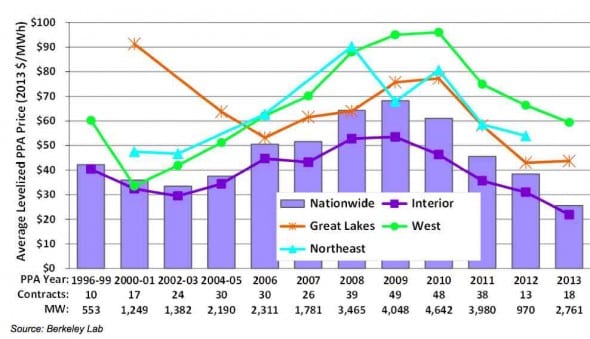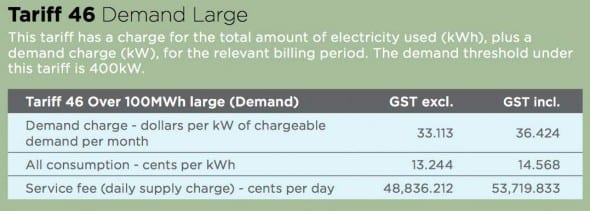This post brings together a number of items on renewable power including US windpower agreements setting the price as low as $US25 MWh (2.5 cents/kWh. WA thinking of importing Indonesian coal for power generation while ignoring renewables and approval being given by the Pt Augusta council for a solar thermal installation that will be used to desalinate water and heat/cool 20 hectares of greenhouses for tomato growing.
1. New US wind power contracts to supply at 2.5 cents per kWh
A new report from the Department of Energy and Lawrence Berkeley National Laboratory found that the price of wind energy for new power purchase agreements signed in 2013 hit an all-time low of $US25 per MWh. The graph shows that the price is trending down from about $US68 per MWh since 2009.

Interestingly
Texas continues to lead in installed capacity, with more than 12GW, while California, Iowa, Illinois, Oregon and Oklahoma all have more than 3GW.
Looks like Texas thinks that it is smarter to sell fossil fuels instead of wasting them on power production?
2.1 WA has a day when windpower provided 25% of consumption. However:
Of course, there may be little chance that any more wind farms will be built in the state any time soon. The WA government has said it would prefer not to, and is currently considering a new report that canvasses importing coal from Indonesia – at a cost of more than $100/tonne.
At that rate, coal fired generation would likely be more expensive than solar to produce, but there is no mention in the report of renewables as a potential energy source into the future. The largely-fossil fuel grid, meanwhile, is supported by more than $600 million a year in subsidies to lower the cost to consumers – a cost of more than $500 per household.
Just to add to the insanity Production at a West Australian coal mine is headed for a four-fold expansion following the approval of a $500 million export facility at Bunbury Port. The WA coal is low rank thermal coal similar to Indonesian coal. At current Aus thermal prices it should sell for about $80/tonne and falling.
3. Hunt is getting irritated by criticism from the solar lobby
Australia’s federal environment minister, Greg Hunt, has launched an extraordinary attack on the head of the Australian Solar Council, John Grimes, after comments the ASC chief made on ABC radio, criticising the Coalition’s “broken promises” on support for renewable energy.
Hunt described Grimes as a “total failure of an industry leader” on Brisbane’s 621 Mornings program on Thursday, and said he should be “utterly ashamed” of comments he made suggesting the environment minister had been “sidelined” in a government that was firmly anti-renewables.
Go to the link to see more on this exchange of words. Hunt also accused the left of being anti electricity on the Bolt report a few weeks ago. Apparently the extreme left is anyone who thinks it is crazy to develop large new coal mines in Qld.
Part of the attack was based on the idea that opposing these mines would be denying electricity to the rural poor in India. The article did point out that:
At a price of US$100/t Adani would need an electricity price of over Rs7/kWh back in India. But in India, a solar plant to deliver power in can be built for Rs5.50/kWh today – with zero inflation or currency risk for the next 25 years.
Interesting one on the attempts of the fossil industry and certain governments to manipulate tariffs and the rules in a increasingly hysterical attempt to stop the growth of solar.
For example, the Qld government (major fossil power and grid owner) has continued to change the rules in its attempts to make solar and power savings unattractive.
In tariff 46, for instance, those daily charges for “service” – originally a charge for reading the meter – have jumped to $488 a day from $42 a day. The “energy” price on consumption is dropped to 10.4c/kWh from 11.6c/kWh. (See right, does not include GST)).
The fixed service charge replaces a “demand charge”, which could vary according to consumption. There is still a demand charge, but only if a customer uses more than a 400kW threshold in any 30 minute interval.
The smart thing about all this is that it makes little difference to the power bill. All it does is remove the incentive to install solar or save power.
This is how Ergon Energy has structured its tariff 46. With GST, the service charge rises to $537 a day.
5. On the good news side Port Augusta council approves solar thermal horticulture expansion
Interesting one. The project will use a 115 metre solar tower with 11,000 mirrors to desalinate water and provide heating and cooling for a 20 hectare greenhouse complex to be used by Sundrop farms to grow tomatoes.

